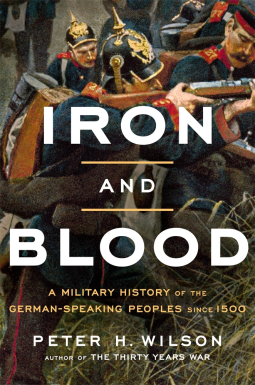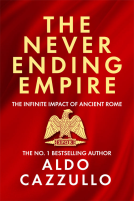
Iron and Blood
A Military History of the German-Speaking Peoples since 1500
by Peter H. Wilson
This title was previously available on NetGalley and is now archived.
Send NetGalley books directly to your Kindle or Kindle app
1
To read on a Kindle or Kindle app, please add kindle@netgalley.com as an approved email address to receive files in your Amazon account. Click here for step-by-step instructions.
2
Also find your Kindle email address within your Amazon account, and enter it here.
Pub Date Feb 14 2023 | Archive Date Feb 21 2023
Harvard University Press | Belknap Press
Talking about this book? Use #IronandBlood #NetGalley. More hashtag tips!
Description
From the author of the acclaimed The Thirty Years War and Heart of Europe, a masterful, landmark reappraisal of German military history, and of the preconceptions about German militarism since before the rise of Prussia and the world wars.
German military history is typically viewed as an inexorable march to the rise of Prussia and the two world wars, the road paved by militarism and the result a specifically German way of war. Peter Wilson challenges this narrative. Looking beyond Prussia to German-speaking Europe across the last five centuries, Wilson finds little unique or preordained in German militarism or warfighting.
Iron and Blood takes as its starting point the consolidation of the Holy Roman Empire, which created new mechanisms for raising troops but also for resolving disputes diplomatically. Both the empire and the Swiss Confederation were largely defensive in orientation, while German participation in foreign wars was most often in partnership with allies. The primary aggressor in Central Europe was not Prussia but the Austrian Habsburg monarchy, yet Austria’s strength owed much to its ability to secure allies. Prussia, meanwhile, invested in militarization but maintained a part-time army well into the nineteenth century. Alongside Switzerland, which relied on traditional militia, both states exemplify the longstanding civilian element within German military power.
Only after Prussia’s unexpected victory over France in 1871 did Germans and outsiders come to believe in a German gift for warfare—a special capacity for high-speed, high-intensity combat that could overcome numerical disadvantage. It took two world wars to expose the fallacy of German military genius. Yet even today, Wilson argues, Germany’s strategic position is misunderstood. The country now seen as a bastion of peace spends heavily on defense in comparison to its peers and is deeply invested in less kinetic contemporary forms of coercive power.
Peter H. Wilson is the author of Heart of Europe: A History of the Holy Roman Empire and The Thirty Years War: Europe’s Tragedy. A contributor to the BBC, the Los Angeles Times, and the Financial Times, he is a fellow of the Royal Historical Society and Chichele Professor of the History of War at the University of Oxford.
Available Editions
| EDITION | Hardcover |
| ISBN | 9780674987623 |
| PRICE | $39.95 (USD) |
Featured Reviews
 Librarian 1031465
Librarian 1031465
A thoroughly researched and well-written German military history from the 1500s to the present. As with previous books by Wilson, this one is also lengthy and presents a vast amount of content. Wilson takes a broad approach, covering German-speaking Europe and tying German military history into the wider array of political and cultural development to provide context, as he aims to break away from the static pre-conceived notions of German military history. The more familiar the reader is with Germany's history or the history of central Europe in general, the more they'll get out of it and be able to make thematic connections. It may be a tough read for anyone looking for an introduction into Germany's military history.
 William H, Reviewer
William H, Reviewer
I have just spent a very satisfying period of time studying an ARC of Professor Peter H. Wilson's magisterial tome entitled "Iron and Blood: A Military History of the German-Speaking Peoples Since 1500" (to be published by Harvard University Press).. While the book was weighty (976 pages in hardcover), I found it oddly hard to put down. For anyone even remotely interested in this subject matter, time spent in the perusal of this book is time well spent, It is thoroughly researched, and Professor Wilson has a deft touch and obvious command of the language which makes for a read the ease of which belies its length. I should also note that the title might be a bit misleading in the sense that this is not an operational military history. While many conflicts and specific battles are referenced in passing here, the author's themes are far grander in design. From weapons technology to bureaucratic and logistical concerns of the evolving military (for example in the design of warships and the casting of canon) as well as the growth of professional mass armies and their evolution from very different militia based feudal levies, the author marshals a formidable array of facts to support a very different perspective on his subject. I have never read a better background to the development of modern Switzerland with its unique military history, nor have I ever seen a work, even amongst those purporting to focus on the Hapsburg Empire(s), that more clearly highlighted their enormously underrated influence on the developing German way of war. Keep in mind that most books examining the evolution of German military thought and practice virtually ignore Switzerland and give equally short shrift to the Holy Roman Empire. Professor Wilson's work suggests very convincingly that this leads to a kind of myopic focus on Prussia to the detriment of the much bigger historical forces in play. Bravo Professor Wilson!
 Stefan F, Reviewer
Stefan F, Reviewer
An extremely impressive history. Vast in scope, yet eminently readable, IRON AND BLOOD offers a new interpretation of the history of the Germanic people (it's not just Germany, but also brings in Austria, Switzerland, and the Prussian empire). It's persuasive and certainly does offer a lot of interesting history and interpretation for a new way to look at this topic.
Wilson's prose is for the main accessible and readable throughout, with the occasional more-stuffy section. It's substantial, which may give some readers pause, but if you are looking for a European history book that you can really sink your teeth into, then IRON AND BLOOD may just be what you're looking for.
I would also highly recommend it to university/college students who are taking course on German/European history. (I have recommended this to my own students, as it happens.)
Recommended.
Readers who liked this book also liked:
Nigel Henbest; Simon Brew; Sarah Tomley; Ken Okona-Mensah; Tom Parfitt; Trevor Davies; Chas Newkey-Burden
Entertainment & Pop Culture, Humor & Satire, Nonfiction (Adult)


















